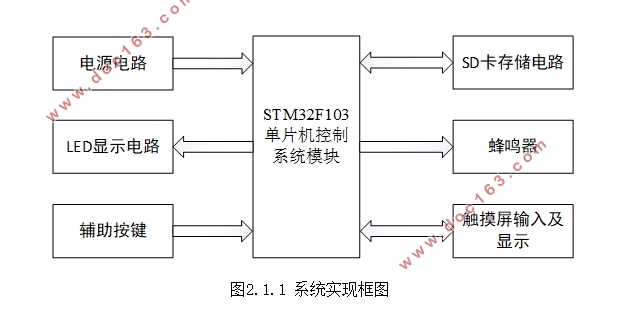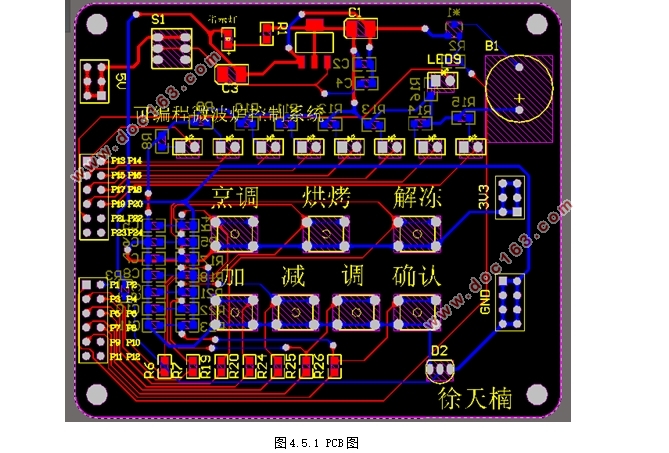可编程微波炉控制系统设计

可编程微波炉控制系统设计(论文13400字)
摘要:本设计是基于STM32F103ZE的可编程微波炉控制系统,以单片机为控制核心,结合定时器和触摸屏进行定时控制。主要目的是设计一款操作简单、界面显示丰富的家用微波炉控制系统,相对于传统的微波炉多了烹调、烘烤和解冻三个智能功能。设计中主要涉及三大模块,一是微波炉功能的选择与设定;二是在液晶屏上对微波炉的工作模式及工作状态进行显示,三是将报警信息通过声音进行提示。首先通过触摸屏设置所需要的功能,再根据所选择的功能对食物进行相应时间和火候的加热的模拟。其中,通过触摸LCD实时显示加热时间、工作模式以及加热结束后进行声音报警提示等。
关键词:STM32单片机;智能控制;触摸屏控制
Design of programmable microwave oven control system
Abstract:The design is based on STM32F103ZE programmable microwave oven control system to single-chip control core, combined with timer and touch screen for timing control. The main purpose is to design a household microwave oven control systemwich with a simple operation and a rich interface ,compared to the traditional microwave oven with cooking, baking and thawing three intelligent functions.The design mainly involves three modules, one is the microwave oven function selection and the establishment; the second is in the LCD screen on the working mode and the working state of the microwave display, the third is the alarm information through the sound prompts. First through the touch screen to set the required functions, and then according to the selected function of the food for the corresponding time and the heating of the simulation. Among them, by touching the LCD real-time display heating time, working mode and after the end of the sound alarm alarm and so on.
[版权所有:http://DOC163.com]
Keywords:STM32 single chip;intelligent control;Touch screen control
[版权所有:http://DOC163.com]


目录
第一章 绪论 1
1.1引言 1
1.2 课题研究背景 1
1.3课题的内容和要求 1
1.4课题的目的和意义 2
第二章 控制系统总述 3
2.1系统实现框图 3
2.2系统功能的实现 3
第三章 各模块设计方案 5
3.1键盘电路设计 5
3.2显示设计 6
3.3报警设计 7
3.4图片存储设计 7
[资料来源:Doc163.com]
3.5微波炉加热原理分析 8
3.5.1 微波的产生 8
3.5.2 微波加热原理 9
3.5.3 微波炉加热原理 10
3.5.4 微波炉的结构 11
3.5.5 微波炉的心脏——磁控管 12
第四章 硬件设计 14
4.1系统控制核心STM32F103介绍 14
4.1.1 STM32F103主要性能 14
4.1.2 STM32F103引脚及功能 14
4.1.3 STM32F103内置功能 14
4.2显示电路设计 15
4.2.1 LED显示电路设计 15
4.2.2 触摸屏显示电路设计 15
4.3蜂鸣器发生电路 17
4.4 PCB图的绘制 17
第五章 软件设计 19
5.1软件总体框图 19
5.2 定时器控制 21
5.2.1定时器时钟配置 21
5.2.2定时器编程控制 21
5.3 触摸屏编程控制 21
5.3.1 触摸屏显示编程 22
5.3.2 触控编程控制 22
5.4 蜂鸣器编程控制 22
5.5各工作模式加热时间与火候 23
第六章 总结 24
6.1 论文总结 24
6.1.1 主要工作及结论 24
6.1.2 存在的问题 24
6.2 感想与收获 24
参考文献 26
致谢 27 [资料来源:http://www.doc163.com]
